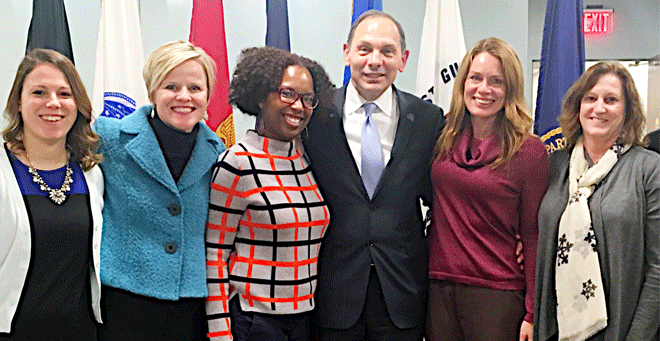 |
|
|
Women veterans health care researcher Kristin Mattocks, PhD, (second from left) is pictured with U.S. Department of Veterans Affairs Secretary Robert A. McDonald and (from left) Lisa Lombardini and Amber Brown of UMMS, and Rebecca Baldor and Judy Kuzdeba of the VA. |
Nearly one in five United States military veterans is a woman, most of who are of childbearing age. The swelling ranks of female veterans have made prenatal and postpartum health care a growing priority for the Veterans Health Administration.
“Originally built entirely for men, the Veterans Health Administration understands that it needs to change to accommodate female veterans. Many improvements have been made in the past decade, but there is still not a single VA facility in the country that provides prenatal care,” said UMass Medical School health researcher Kristin Mattocks, PhD, associate professor of quantitative health sciences and psychiatry.
In order to better understand the needs and experiences of female veterans during pregnancy and following childbirth, Dr. Mattocks and colleagues have launched the first ever VA study of women’s maternal health care issues and needs. Jointly sponsored by UMMS and the VA Central Western Massachusetts Healthcare System, where Mattocks serves as associate chief of staff for research and development, the three-year Center for Maternal and Infant Outcomes Research in Translation (COMFORT) study will inform ongoing efforts to improve prenatal maternity and postpartum care coordination and follow-through for women enrolled in the VHA.
“We recently found that the number of women veterans delivering babies using VHA maternity benefits has nearly doubled in the past five years, and yet virtually nothing is known about how they access and use maternity care services, how their maternity care is coordinated, or how ongoing VHA care including primary care, specialty care, mental health care is managed during and after pregnancy,” said Mattocks. “Coordinating maternity care with ongoing VHA care for pregnant veterans is crucial because many women using VHA care have complex medical and mental health conditions that may increase their risk for adverse pregnancy outcomes.”
The mental health needs of women who are both veterans and mothers are especially concerning to Mattocks and colleagues because conditions such as depression, pain and PTSD are common among women veterans using VHA care, and these conditions may necessitate ongoing treatment during pregnancy. Given pregnant veterans’ existing mental health burdens, they may also be at increased risk for postpartum depression, which may in turn lead to poor infant and maternal outcomes.
“No one has ever measured postpartum depression in women veterans,” said Mattocks. “We don’t know how women who have faced the challenges of war as well as the ordinary challenges of motherhood in our society are doing, or how their kids are doing.”
The three-year COMFORT study is the first of its kind to survey women served by a diverse array of Veterans Health Administration facilities at 13 sites across the country, ranging from extremely rural areas to urban hubs. Interviews with VHA primary care, gynecologic and mental health providers, as well as with community obstetricians caring for pregnant vets through the VHA’s fee basis program, will investigate prevailing approaches for pregnancy and maternity care delivery, including barriers and facilitators to care coordination.
Veterans will be interviewed during pregnancy and after giving birth to gain their perspectives of and experiences with pregnancy, mental health and maternity care coordination. Finally, investigators will integrate provider and patient findings into recommendations for VHA research, practice and policy focused on pregnancy, mental health and maternity care coordination.
“Research drives policy at the VA. This is advocacy based research,” Mattocks emphasized. “We are doing this work to push the agenda to make sure women veterans are getting the care they need.”
Related link on UMassMedNow:
U.S. Veterans Affairs Secretary visits UMass Medical School